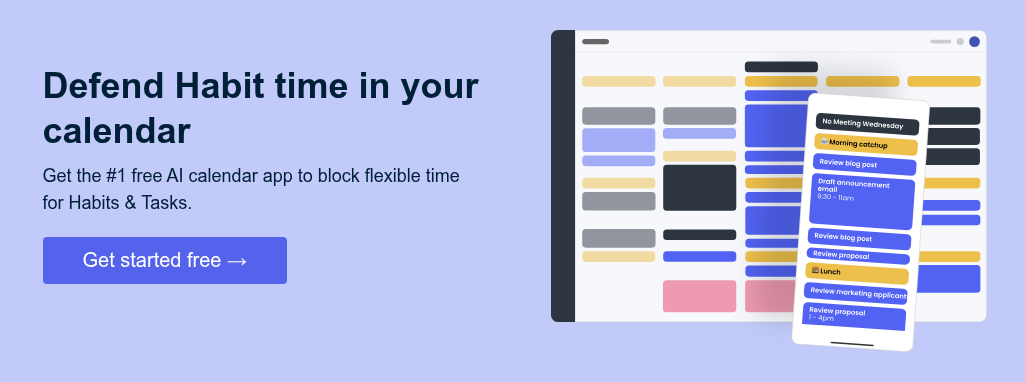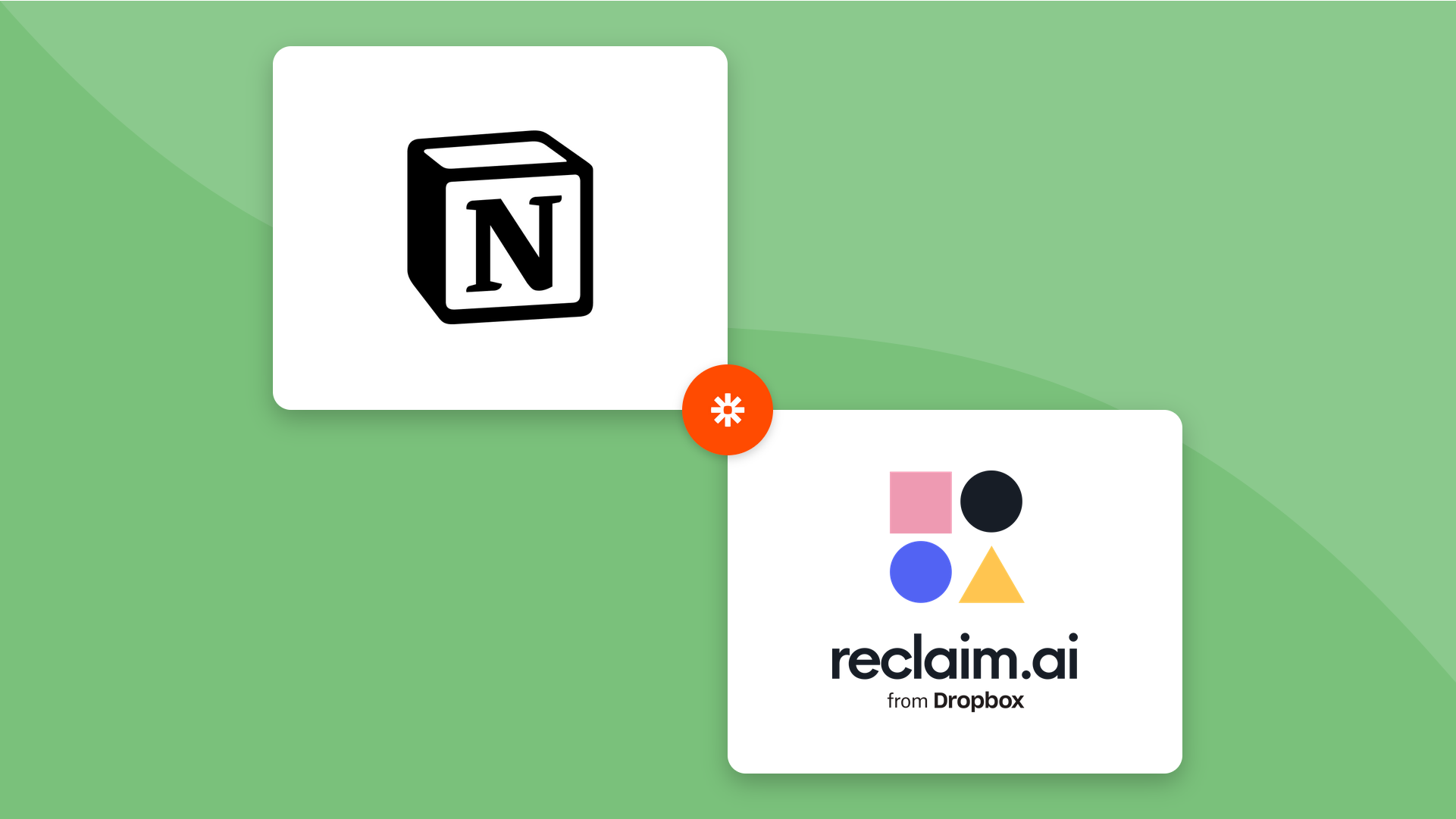As a writer, my days are full of ideas – hours spent reading about them, shaping my thoughts, and rewriting them out. It’s deeply satisfying work, but often difficult for my brain to clock out afterward. The ideas of the day have a habit (excuse the pun) of sticking around, even after I leave my desk – a bad habit, I know. As a result, for quite some time now, I’ve thought about taking up a meditation practice.
Healthy habits are the ones that support our mental health, but as anyone who’s tried behavior change knows, tidy plans and real life don’t always match. So, how long does it take to form a new habit? When will new habits stop feeling like another chore on the list and start feeling automatic?
Ready to learn the mechanics of habit building and what truly predicts successful habit formation?
What is a habit?
A habit is a behavior that becomes automatic when triggered by a cue. Psychologists call this automaticity: the feeling that you’re doing something almost without thinking, because your brain has wired that desired behavior to a specific signal in your environment or daily routine.
But here's where people often get tripped up. We do lots of things on a regular basis that wouldn't necessarily be "habits." For example:
- A routine is an intentional sequence of actions you carry out by choice (like following your morning checklist before work).
- A habit is something you do on autopilot after being sparked by a clear cue (like hitting the garage door opener when you walk into the garage).
- A skill is something you choose to learn and practice over time (like pottery or roller skating). No matter your mastery, skills might never feel entirely automatic because they often require conscious effort on your part.
We're not trying to split hairs here. You may set out to form a new habit development, and after some time, find yourself frustrated by an apparent lack of progress. But routines and skills almost always need a level of discipline and effort.
The research behind habit formation
There's a lot of interesting science and research around habit formation, though the findings vary pretty wildly and don't offer a simple magic number.
A 2009 University College London research team set out to understand how habits form in daily life. Participants chose a single daily behavior (like drinking water after breakfast or doing sit-ups right after their morning coffee) – each day rating how automatic the behavior felt.
Research findings:
- The median timeline was 66 days for the habit to form.
- Some needed only 18 days, others took up to 254 days.
- New habits form quickly in the first few weeks, then taper off.
- Skipping a day occasionally didn’t derail the habit-forming process. Consistent repetition over time was ultimately what mattered most.
The "66 days" number popularized by authors like James Clear in his book Atomic Habits comes directly from this study. But this number emerged from controlled, straightforward daily behaviors – not complex or irregular activities.
So, is it going to take you 66 days to form a new habit? Maybe, but we’re not quite done yet:
More recently in 2024, a broader analysis reviewed results from 20 separate studies across 2,601 participants on real-world habits, covering everything from going to the gym and healthier eating to remembering to take your medication. Their findings paint a broader picture:
- It takes 2–5 months for new habits to feel established.
- 59-66 days was the median time to form a habit (middle value of dataset)
- 106-154 days was the mean time to form a habit (average across all)
- Results widely varied from as little as 4 days up to 335 days
- Habits participants chose themselves, actually enjoyed, and repeated consistently (especially in the morning) tended to form faster.

What this means for you
Both of these studies agree on something: there's no universal number of days to form a habit. Some people form habits within weeks; others might take months.
Building this nuanced understanding helps you set expectations and develop positive changes so you can find your magic number. You don’t need a perfect streak of X amount of days to form a new habit – consistent repetition over time is what actually matters.
Take meditation, for example. It isn't a demanding physical activity, but it requires consistent mental focus. Given the research, I’m likely looking at around 2–3 months before meditation stops feeling effortful and becomes automatic. I don’t need to meditate every single day for 2-3 months – I just need to build consistent context around this behavior to start achieving automaticity.
How many repetitions do you need?
So, how many repetitions do you need to form a habit? Well, it, uh, depends 👉👈
Here's what we do know: early, consistent practice can materially affect how quickly automaticity builds. When you first start practicing a new habit, each repetition rapidly strengthens the mental connection between cue and behavior. Since automaticity climbs quickly early on, then gradually tapers off – a lot of your progress comes in those initial weeks (so try your best to get as many consistent repetitions in as possible early on).
Rule-of-thumb ranges
Here’s how things might play out:
- Simple daily habits (like drinking water with lunch or adding more fruit to your plate): Often feel easier after ~30–60 repetitions (about 4–8 weeks of daily practice).
- Moderately complex daily habits (like 15 minutes of more exercise, journaling, or meditation): May take 60–100 repetitions (roughly 2–3 months).
- Less frequent or more challenging habits (like a weekly long run, cooking new recipes, or multi-step routines): Can require dozens of exposures spread across many months to feel automatic.
At the end of the day, when you ask, “how long does it take to form a habit,” you should be thinking in terms of repetitions, not in days or weeks. A daily habit completed 30 times typically feels more automatic than something you've done just as often but spaced out every week, because the brain encodes cues faster with higher frequency.
And if you miss a repetition here or there? Don't panic. Your brain doesn't wipe the slate clean because you missed a day. It simply rewards steady accumulation over time.
So, returning to my meditation habit, I'd imagine the resistance starting to ease around my 30th daily session. So stack your repetitions closely, stay consistent (not perfect), and you'll likely find automaticity sooner rather than later.
Debunking the “21‑day rule”
You may have heard “it takes 21 days to form a new habit.” It's catchy, neat, and appealing. Exactly the kind of number that you may be looking for when you clicked on this article. There's just one issue: this tidy “three weeks” promise isn’t actually true.
The origin traces back to Maxwell Maltz, a plastic surgeon who, in his 1960 book Psycho-Cybernetics, observed that it took his patients roughly 21 days to adjust to visible physical changes, such as getting used to a new face after surgery or adapting to a prosthetic limb. But Maltz never claimed that habits, in general, took precisely 21 days to form. Nevertheless, his simple observation snowballed.
Decades later, the myth endures, not because it's accurate, but because it’s appealingly simple. As James Clear notes though, the 21-day rule was never rooted in science. Real research on habit formation tells a very different story.
Top 8 tips to form habits faster
While the 21-day rule isn’t grounded in scientific research, the studies we’ve seen have shown different habits form at different paces.
Let’s review the top 8 tips you can leverage to form your habits faster:
1. Repetition frequency
How often you repeat a behavior matters a lot. Daily habits form faster because your brain encodes the cue-response link more quickly with frequent repetition.
If possible, shrink your habit down so you can practice it every day, even if only in a tiny way. For example, reading one page daily will create automaticity faster than reading an entire chapter once per week, or a quick 2-minute jog daily will outperform a lengthy weekend run.
2. Complexity
Simple, single-step habits (like drinking water after lunch) tend to feel automatic faster. Multi-step sequences or habits with multiple moving parts (like cooking a full healthy dinner) take longer. Researchers often separate these into two stages: instigation (starting) and execution (completing).
Automate the instigation step first. For example, focus on consistently putting on your running shoes every day. Once the first step becomes effortless, let the execution evolve naturally over time.
3. Cue consistency & context stability
Habits thrive on predictable cues. The same time, place, or signal repeatedly triggers the behavior, speeding up automaticity. On the other hand, changing cues or environments frequently disrupts habit formation.
Tie your habit to a fixed, reliable cue like "after brushing teeth," "after turning off my alarm," or "as soon as I log into my laptop." Try to keep this cue as stable as you can. Don’t change locations or timing while the habit solidifies.
4. Enjoyment
The more rewarding a behavior feels, the faster your brain reinforces it. Intrinsic enjoyment or immediate satisfaction accelerates habit formation.
Pair new habits with something pleasurable, listen to a favorite podcast during walks, savor a special coffee after journaling, or track your daily wins visually to generate rewarding streaks.
5. Timing
For some people, it’s easy to form and adhere to new habits in the mornings. Why? Morning habits benefit from fewer competing demands and fresher willpower.
If your schedule allows, slot new habits into your morning routine before life’s distractions pile up and priorities shift throughout the day.
6. Self-chosen vs assigned
Habits you choose voluntarily become automatic faster than those forced on you (like a doctor’s recommendation). Autonomy significantly boosts intrinsic motivation.
Choose habits that genuinely excite or resonate with you, not habits you simply feel you "should" do. Of course, this is not always possible. So, if a habit does feel imposed, consciously reconnect it to personal values or meaningful goals.
7. Friction
The harder something is to start, the longer it takes to become automatic. BJ Fogg’s Behavior Model describes how behaviors happen only when Motivation, Ability, and a clear Prompt converge at the same time. Lowering friction makes habits form faster.
Redesign your environment to make habits easier: put your running shoes by the bed, pre-fill a water bottle, or set one-click reminders.
8. Identity alignment
Habits congruent with your self-identity form faster because they feel natural, not forced. Identity-aligned habits require less mental negotiation or willpower.
Reframe habits as part of who you are: “I’m the kind of person who…” For example, don’t say "I want to read more," say "I'm a reader." Rather than "I'm trying to run regularly," embrace "I'm a runner."
Does time of day matter?
Does the time of day really affect how easily a habit sticks? It might seem trivial, but research suggests timing plays a bigger role than we think. People who practice habits consistently in the morning often experience quicker and stronger automaticity.
Mornings usually present fewer distractions and more predictable routines compared to afternoons or evenings. Your morning routine acts like a clean, reliable anchor for new behaviors.
That said, the best time for building your habit isn't necessarily morning or evening. It's whichever time you'll reliably show up. A habit you consistently do at night beats an ambitious morning plan you never quite get around to. The trick is pairing your habit with a stable, recurring cue. In other words, something you can't miss.
A few examples of effective cues:
Morning:
- Alarm rings → put on shoes → 10-minute walk
- Brew coffee → 2-minute stretch as it drips
Evening:
- Close laptop → jot down three lines in a journal
- Brush teeth → floss quickly before bed
If you're not sure when your habit would work best, try mornings first. But don't force it. Habit formation isn't about doing it "perfectly," it's about doing it consistently. Ultimately, the most reliable formula is simple:
Habit + clear cue + consistency = automaticity
3 reasons your habit hasn’t “clicked” yet
You've been showing up and repeating your habit for weeks, but it still doesn't feel automatic. Don't get discouraged – it doesn't mean you're failing, your habit just needs some fine-tuning. So, why is your habit not quite clicking?
1. You picked a routine, not a habit
If your habit consistently feels forced, like you're pushing through on sheer willpower every single time, chances are you've set up a routine, not a habit. Routines require deliberate effort and attention each time; habits happen automatically, triggered effortlessly by clear cues.
Take a second look at your behavior. Is the cue clear and consistent? If your goal is vaguely stated, like "exercise more," it won't become automatic. Make it more specific and cue-dependent. For example, "After brushing my teeth each morning, I'll do 10 squats." Clear cues make automaticity possible.
2. The cue isn’t working
One of the biggest obstacles to habit formation is a weak or inconsistent cue. A fuzzy intention like "I'll practice yoga when I have some free time" doesn't reliably trigger your brain into action.
Don’t rely on motivation alone. Swap or simplify your cue. Place the yoga mat next to your laptop so shutting down at 5 p.m. triggers the new routine. Or anchor your habit to a specific daily routine, such as doing yoga "right after my morning coffee."
3. You’ve focused on execution, not instigation
Researchers differentiate between instigation (the effort of starting) and execution (actually doing the activity). Often, habits fail because the instigation step (simply getting started) never becomes automatic, even if the actual execution is enjoyable and manageable once underway.
Meditation is a perfect example of an instigation problem. Most people find meditation itself calming once they've begun, but struggle with the simple act of sitting down to start.
Don't try to automate the whole process right away; instead, automate just the first step. For example, focus solely on sitting down in your meditation spot at the same time each day, even if you only stay there briefly. Once initiating the habit has become effortless, you can gradually increase or vary what follows.
When your habit isn't clicking, it's tempting to blame yourself for a lack of discipline. But, usually, the problem lies in the structure, not your motivation. Before you give up, ask yourself:
- Did I accidentally design a routine instead of a true habit?
- Is my cue clear, stable, and obvious enough?
- Have I automated the habit's initiation rather than trying to automate every part?
Make the timeline work for you 📅
If there’s one thing the research makes clear, it’s that habits don’t “switch on” in a day. They accumulate.
Make habits easier with Reclaim.ai
The habit formation process can be made even easier if you let your calendar make time for you:
- Auto-schedule your reps: Set how often you want the habit (e.g., 5×/week, 2×/week) and Reclaim finds the best spots on your calendar. No manual juggling.
- Honor your best window: Prefer mornings for that “fresh start” effect? Or evenings after shutdown? Add preferred time windows and let it place sessions there first.
- Stay consistent when life happens: Meetings pop up, plans change. Reclaim reschedules your habit automatically so you keep your streak alive.
- Reduce friction: Calendar events become concrete cues (and optional reminders) so instigation gets easier day by day.
- Keep everything in one place: Your habits live alongside work and life obligations, so you’re not battling your own schedule.
Set it up in 60 seconds
- Create a new Habit in Reclaim.
- Name it (e.g., Meditation), set frequency (e.g., 5×/week) and duration (e.g., 10 minutes).
- Choose your time window (Morning or Evening) and days.
- Turn on reminders if you want a gentle nudge.
- Save. Reclaim will place and protect those sessions, and move them when conflicts arise.
Ready to make your habit automatic?
Try Reclaim.ai today and let your calendar handle the hard part.










.png)





















